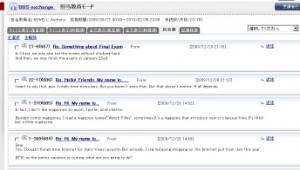02-02. Combination of Online Tools Produces Significant Outcomes in Student-Centered Learning
Anthony Newell
Professor, Faculty of Political Science and Economics
The course English III, run by Professor Newell, involves long-distance exchanges with the Capital Normal University (CNU) in China. Online tools — videoconferencing, chat, email, and Course N@vi BBS — are indispensible to the course’s functioning. We asked Professor Newell for ideas about how to use these tools to improve course outcomes.
Connecting to China with videoconferencing and making presentations online
English III is a subject for students who have completed the first-year English I and English II courses and is intended for second-year and higher students. Using online exchanges with an overseas university, the goals of English III are to exchange opinions and information using practical English communications and develop an understanding of the other country’s culture and ways of thinking.
The core of the course’s activities is the videoconferencing system. The Waseda and CNU classes are divided into groups of five students each. The groups research such topics as “culture life,” “economic life,” and “tour of the country” and then give 30-minute presentations on their topic using PowerPoint. The geographical advantage of only a one-hour time difference lets students at both universities engage in online exchanges in real time.
For many of the students, not only is it their first time presenting in English; it is also their first experience to make a presentation of any kind. Therefore, students learn the skills and knowledge needed to make presentations over a number of weeks prior to the exchanges. Students take lectures on such computer skills as manipulating PowerPoint and using search engines and on using BBS, email, and online chat. At the same time, they acquire the necessary knowledge for communicating in English, such as tips on self-introductions in English, English mistakes that Japanese frequently make, and how to ask questions when you don’t understand what the other person said.
Exchanging opinions via chat, email, and BBS
In addition to videoconferencing, online chat, email, and Course N@vi BBS are used to exchange opinions on presented topics.
“The most convenient tool the students use is the BBS. Students can only make use of synchronous systems like online chat and videoconferencing at predetermined times, but with BBS students are free to participate when they want and at the pace they want.”
Another advantage of the BBS is that posted information is shared among all students. “If you have a question about a presentation and send an email directly to the presenter, the answer is limited to what the presenter knows. But with a BBS post, many students will see the question, and anyone who knows the answer can provide the information.”
At the same time, students occasionally become interested in a topic they initially were not keen on while reading other people’s posts on a BBS. “Many times, what started out as a conversation between two individuals is joined by first one person and then two and gradually the circle is expanded and it winds up becoming a full-blown group discussion.” Providing opportunities to expand one’s thinking in unexpected ways like this is the attraction of BBS.
Students adapt their usage of the tools according to each tool’s characteristics, such as using chat when they want an answer right away or using email for personal messages they don’t want others to know about. “Once students know each other’s faces through videoconferencing and exchange opinions through a combination of these tools, they become more intimate with students at the other university and deepen their exchanges.”
Schemes to stimulate BBS participation
In English III, all students are obliged to give presentations in turn on the videoconferencing system. They also earn marks for participating in BBS, email, and chat. Professor Newell regularly checks how much each student is using each tool. He instructs the students to make balanced use of all the tools. If a student is always using chat and rarely posting on BBS, he will remind the student directly to make more BBS posts.
For BBS, Professor Newell uses a system that calculates the number of words a student posts and gives more marks the more words a student posts. “Grammatical mistakes in English are never an issue with BBS posts. The target of the student assessments is that their participation be as active as possible.”
The idea behind this system and the course’s basic policy is to prioritize getting one’s meaning across over grammatically correct English. “The amount of practice is key to developing communication skills using English.”
The professor will sometimes give comments when a mistake is so bad that the meaning is not conveyed to the other party, but this is rarely necessary as students work with the Chinese students to communicate their intentions.
Generally speaking, BBS tend to heat up when many people actively participate but become irrelevant when there are few posts. As a way of instilling posting as a habit, all students in this course are obliged to make a least one post on the first BBS. After this, students are free to participate at their own pace, but over time they tend to participate actively on their own initiative.
It appears that faculty staff schemes — such as making conditions easy for the initial posts and giving marks the more a student posts — lead to vibrant exchanges of opinions.
Necessity of limiting access to a subset of students
At the same time, there have been occasions where a careless comment on a forum has led to unexpected problems and to arguments getting heated and going off on wild tangents. Therefore, Professor Newell warns his students beforehand about the taboos when using forums. “Especially when communicating with Chinese students, it is necessary to avoid unnecessary references to political or historical problems. I also make it clear to them at the start that the faculty staff have the privileges to view everything they write on the forums.” By cautioning students in advance like this, no major problems have occurred so far.
It is important to always be vigilant about who can see anything you write, whether on a forum or not. Professor Newell previously learned this lesson the hard way. “I once uploaded to Course N@vi some materials on issues that from a Chinese perspective were somewhat sensitive.” He mistakenly thought that the materials would not be seen on the Chinese side, but in fact it did attract the attention of his opposite party. “Fortunately, it didn’t turn into a big deal, but it left me in a cold sweat.”
To avoid problems like this, Course N@vi lets faculty members divide enrolled students into multiple groups and restrict use of certain forums or other functions to a certain group. It is also possible to set up a course separate from the official course. For English III, Professor Newell has set up an unofficial course just for Waseda students that Waseda students use to exchange information.
Online tools play a huge role in independent student learning
Presentations using the teleconferencing system continue for six weeks. After all these presentations are over, Waseda class students make further presentations and submit reports to extend the knowledge obtained from the previous exchange activities.
Students earn bonus marks in their final presentations and reports if they include information obtained directly through exchanges with Chinese students and not just knowledge accumulated from various materials on their own. “Things that occur in videoconferences or in chats essentially can only be seen at that time, but a log is kept of all forum posts. Because the logs can be searched by keyword, they are really useful when writing reports.”
Through this course, students experience using living English to acquire necessary information and knowledge. Students who complete the course develop a huge amount of confidence through this process.
English III stresses independent student learning rather than one-directional teaching from faculty member to student. Faculty members are strictly facilitators and organizers and exist principally to monitor and support the process by which students learn on their own. Students are required to figure out things they don’t understand by doing their own research or asking other students.
Given these conditions, how to make best use of the available means for communicating with people in a distant location takes on a very significant meaning. English III is one example of where combining various kinds of synchronous and asynchronous online tools — teleconferencing, chat, email, and Course N@vi forums — maximizes this outcome.
Tips on implementing Course N@vi
“Forums are an irreplaceable part of running an exchange course effectively. I believe forums are the perfect tool for deepening communications.”
<BBS window>
English III BBS are popular among students from both universities and are the scenes of a flurry of posts and activity.



